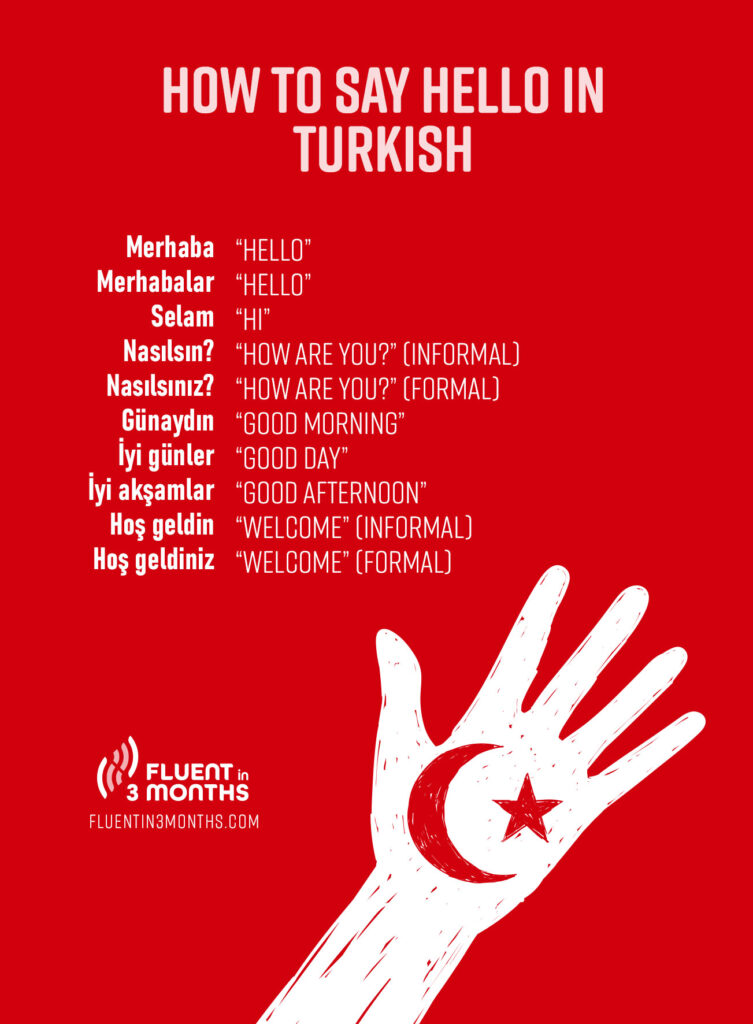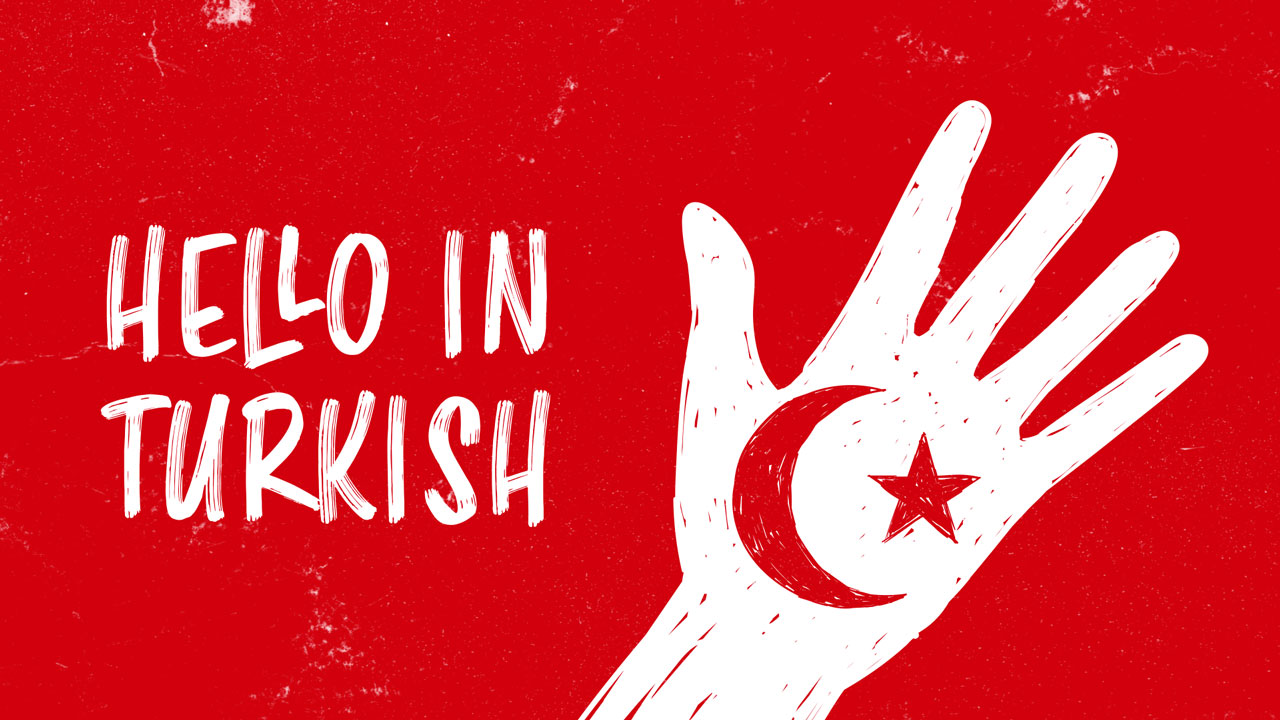From Dawn to Dusk: How to Say Hello in Turkish
Merhaba is the most common way to say “hello” in Turkish. But it’s far from being the only one. Depending on the context, you’ll also hear the more casual selam, the welcoming hoş geldiniz, or the morning-specific günaydın.
As a native speaker, I’ve rounded up different ways to say hello, how to respond to hello in Turkish, and other common greeting words. Here is an overview of what we’ll cover:
Table of contents
- Merhaba: The Most Common Turkish Greeting
- Selam: A More Casual Way of Saying Hello in Turkish
- Merhaba or Selam : Which One Should You Use?
- Selamün Aleykum, Aleyküm Selam: Religious Ways of Saying Hello
- Turkish Greetings for Every Time of Day
- How to Say Welcome in Turkish
- How Do Turks Greet Each Other?
- How Do You Respond to Merhaba ?
- Nasılsınız? – “How Are You” in Turkish
- Say Merhaba to Learning Turkish
| English | Turkish | Audio |
|---|---|---|
| “Hello” | Merhaba | |
| “Hello” | Merhabalar | |
| “Hi” | Selam | |
| “How are you?” (informal) | Nasılsın? | |
| “How are you?” (formal) | Nasılsınız? | |
| “Good morning” | Günaydın | |
| “Good day” | İyi günler | |
| “Good afternoon” | İyi akşamlar | |
| “Welcome” (informal) | Hoş geldin | |
| “Welcome” (formal) | Hoş geldiniz |

Merhaba: The Most Common Turkish Greeting
Merhaba is a versatile word you can use to say hello, no matter the situation. You can say merhaba at any time of the day, with anyone you meet, no matter if you address them using the formal or informal register.
You may also hear people say merhabalar instead of merhaba. This word has the plural suffix lar, and literally translates to “hellos.” It’s slightly more casual, but you can use merhaba and merhabalar interchangeably.
Why Do Turks Say Merhaba?
Merhaba comes from Arabic, and it means “welcome” or “hello.” It entered the Turkish language from Arabic, most likely during the Ottoman Empire, a period when Arabic had a significant influence on Turkish.
Selam: A More Casual Way of Saying Hello in Turkish
Selam is the Turkish equivalent of “hi” or “hey.” It’s widely used among friends, family, and younger people, and is as popular as merhaba.
Merhaba or Selam: Which One Should You Use?
While both merhaba and selam mean “hello,” we can say that selam is the more informal version of saying hello. That said, you can use selam in formal contexts without worrying if it’s too informal.
I’d say when you’re speaking to family or friends, always go for selam. Merhaba is fine too, but it might not give off the friendly vibe you might want to give.
Selamün Aleykum, Aleyküm Selam: Religious Ways of Saying Hello
Does the phrase selamün aleykum look familiar? It probably does, as we just covered selam. Selamün aleykum is the long version of the casual Turkish greeting selam.
This Arabic-origin phrase means “Peace be upon you.” You’ll likely hear it in religious contexts. Here’s how it goes: someone greets the others by saying selamün aleykum. Others reply aleyküm selam, wishing peace to the person who initiated the greeting.
That said, you won’t hear it as often as merhaba and selam.
Turkish Greetings for Every Time of Day
Merhaba and selam are great, but they’re not time-specific. Similar to English, Turkish also uses different greetings depending on the time of the day, such as “good morning” and “good afternoon.”
Günaydın: “Good morning” in Turkish
If it’s before noon, you can greet people with günaydın (“good morning”). When someone says günaydın to you, you can reply günaydın as well. If it’s too early in the morning, anticipate their need for some coffee and ask kahve ister misin? Here is an example dialogue:
- Günaydın! – “Good morning!”
- Günaydın! Kahve ister misin? – “Good morning! Would you like some coffee?”
- Çok iyi olur! – “That would be great!”
İyi Akşamlar: “Good Afternoon” in Turkish
As the day winds down, you can switch to iyi akşamlar (“good evening”). This can be both a greeting and a parting, as you can use it instead of both “hello” and “goodbye.”
- Merhaba, iyi akşamlar. – “Hi, good afternoon.”
- İyi akşamlar, nasılsın? – “Good afternoon, how are you?”
- İyiyim, sen? – “I’m good, and you?”
İyi Günler: “Good Afternoon” or ”Good Day” in Turkish
For that period between the morning and the evening, you can use iyi günler, which translates to “good day” in Turkish.
How to Say Welcome in Turkish
When you’re hosting a party, a dinner, or any other type of greeting, use hoş geldiniz to say “welcome.”
Note that hoş geldiniz is the formal or plural version of “welcome,” so you say it to either someone you address using formal language or to a group of people. If you’re welcoming a friend, you should say hoş geldin, a more informal way to say welcome.
Fun fact: there is a customary response to hoş geldiniz. When someone welcomes you with this phrase, you can respond with hoş bulduk, which literally translates into “we are welcomed,* meaning you appreciate the invite.
How Do Turks Greet Each Other?
A handshake, a kiss on both cheeks, or kissing hands — these can all follow a merhaba in Turkish culture.
Handshake: The Universal Greeting
Handshakes are common, especially in formal or business settings. They’re also the safest option when meeting someone for the first time, both when greeting and parting.
Cheek Kisses: For Friends and Family
Kissing on both cheeks is a warm greeting among Turkish friends, as is the case in many Mediterranean countries. The “kiss” is often just a touch of cheeks with a kissing sound.
Kissing Hands: A Bayram (Eid) Tradition
In aid, or “bayram,” it’s traditional to show respect to the elderly by kissing their hands and then touching their forehead. Bayrams are religious holidays in Turkey, with the two most important being Ramazan Bayramı (“Eid al-Fitr”) and Kurban Bayramı (“Eid al-Adha”). During these festive times, younger people visit the elderly and kiss their hands to wish them a happy bayram.
This greeting is more common during religious holidays or in more traditional settings rather than daily life. As a visitor, you’re not expected to kiss hands, but don’t be surprised if you see it happening, especially in more conservative or rural areas, or during Bayram.
How Do You Respond to Merhaba?
When someone says merhaba to you, the easiest response is to say merhaba right back! You can also say selam or ask a follow up question like nasılsınız? (“how are you?”)
Here are some common answers to merhaba in more detail:
Nasılsınız? – “How Are You” in Turkish
Nasılsınız? (“How are you?”) is one of the most common follow-up questions to merhaba. Note that nasılsınız is the formal or plural version — if you want to ask “how are you” to a friend, say nasılsın? instead.
In more informal contexts, you can use naber instead of nasılsın. Think of naber as “what’s up” and “nasılsın* as “how are you.”
Bonus word in case you’re speaking to Turkish Cypriots: napan, pronounced “na-pahn,” is how you say “what’s up” in informal contexts!
The most common responses to nasılsınız, nasılsın, naber or napan are iyiyim sen (“I’m fine and you?”) or iyiyim teşekkürler (“I’m fine, thanks”). Thank you in Turkish goes a long way!
Tanıştığımıza Memnun Oldum (“Nice to Meet You”)
Use this phrase when you’re being introduced to someone new. It’s a polite way to say “nice to meet you” or “pleased to meet you.”
Say Merhaba to Learning Turkish
“Hello” in Turkish is often the first step to learning the language. Now you know merhaba and more — you can say selam in more informal contexts, günaydın in the morning, iyi akşamlar in the afternoon, and more!
Check out our favorite Turkish resources for book recommendations, dictionaries, and Turkish learning websites — you’ll soon move beyond merhaba!



Social